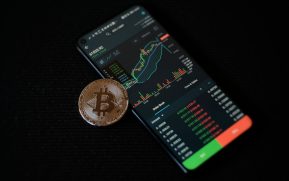
Rachel Martin
David Gura
One of the world’s largest crypto exchanges has filed for bankruptcy. Facing a liquidity crunch, FTX stopped withdrawals, and one of its rivals declined to step in to help.
RACHEL MARTIN, HOST:
The cryptocurrency giant FTX has filed for bankruptcy. Just recently, it was a popular trading site valued at $30 billion. Now its CEO has resigned, and the company has imploded, with big economic implications that could spread beyond crypto. NPR’s David Gura is here with all the details. Hey, David.
DAVID GURA, BYLINE: Hey, Rachel.
MARTIN: All right. So first, tell me about this bankruptcy filing. What do we know?
GURA: Yeah. So about a week after the first signs of trouble, FTX – which has been a huge player in the world of crypto, really one of the largest crypto exchanges, with a big international presence – filed for bankruptcy protection in Delaware, along with 130 affiliated companies. It had this very charismatic founder and CEO named Sam Bankman-Fried. He was, until recently, a billionaire many times over. Well, this morning, FTX says he’s resigned. He now faces a lot of legal and regulatory scrutiny. And the backstory here – again, this goes back just a few days – is there were rumors and reports FTX was not fully solvent. And after another crypto billionaire, one of Sam Bankman-Fried’s rivals, publicly withdrew his assets from FTX. There was panic, basically a run on FTX, which halted withdrawals. And, Rachel, what we’ve learned since is much of the substance of those rumors and reports was real.
MARTIN: Wow. So what does this mean for crypto? I mean, is it all just smoke and mirrors, David?
GURA: Well, to be determined, but first and foremost, it’s very likely FTX’s customers are going to lose their money. The company’s new CEO says in a statement his goal is to maximize recoveries for shareholders. But a prominent venture capital firm that invested in FTX says it’s written that investment down to zero. It sees it as worthless. And the fallout from this is going to extend far beyond FTX. Lee Reiners runs the Duke Financial Economics Center.
LEE REINERS: The crypto economy is tightly interconnected, right? FTX’s failure hasn’t happened in a vacuum. I mean, over the past year, we’ve been in what’s known as the crypto winter. We’ve seen a number of high-profile failures.
GURA: In fact, FTX stepped in to try to prevent some of those failures during this downturn, during this crypto winter, which Reiners says is turning into a crypto ice age. Now there are questions about what happens to deals Sam Bankman-Fried made to bail out and to buy out rival companies. And all this uncertainty has just added more volatility to an already very volatile asset. Bitcoin is down about 75% from a year ago, when it hit its all-time high.
MARTIN: OK, so this has obviously rocked the world of crypto. But, I mean, the economy’s all connected, right? So how likely is this to be felt beyond crypto in the broader economy?
GURA: Well, it seems unlikely this is going to be another Lehman moment, as some have suggested, meaning a crisis like we saw back in 2008 with the investment bank Lehman Brothers that contributed to the global financial crisis. Lee Reiners at Duke says there’s no evidence it will be. So, for instance, Rachel, this has not dragged down the stock market substantially.
REINERS: It hasn’t spilled into the traditional financial system and threatened financial stability. And we should view that as a policy success.
GURA: Reiners says there’s still a pretty stark divide between crypto and the traditional finance system, and the value of crypto is tiny relative to, say, the value of stocks. But this is raising alarm again, Rachel, about how little regulation there is in crypto, how little protection there is. Remember; there’s no lender of last resort in crypto, no government agency that’s standing by to bail out this company or its customers.
MARTIN: So is Sam Bankman-Fried saying anything?
GURA: He’s apologized in a very long Twitter thread. He’s staying on to help with the transition to new leadership. But the situation here is dire. FTX’s U.S. platform issued a short warning it may halt trading in the coming days. We don’t know how the Chapter 11 filing is going to affect that right now. And we’re going to hear more from politicians and regulators in the U.S., but also around the world, including in the Bahamas, where FTX is headquartered. Regulators there have taken steps already to freeze the firm’s assets.
MARTIN: NPR’s David Gura. We appreciate you, David. Thanks.
GURA: Thanks, Rachel.
Copyright © 2022 NPR. All rights reserved. Visit our website terms of use and permissions pages at www.npr.org for further information.
NPR transcripts are created on a rush deadline by an NPR contractor. This text may not be in its final form and may be updated or revised in the future. Accuracy and availability may vary. The authoritative record of NPR’s programming is the audio record.
Sponsor Message
Become an NPR sponsor
 How To Make Huge Profits In A Short Time With Crypto
How To Make Huge Profits In A Short Time With CryptoGet detailed training system that shows an absolute beginner (without any skill) how to make huge profits in a short time with crypto.
 Crypto + NFT Quick Start Course
Crypto + NFT Quick Start CourseThe #1 course for profit in the Crypto & NFT world - You will discover the secrets that 99% of people don’t know yet





